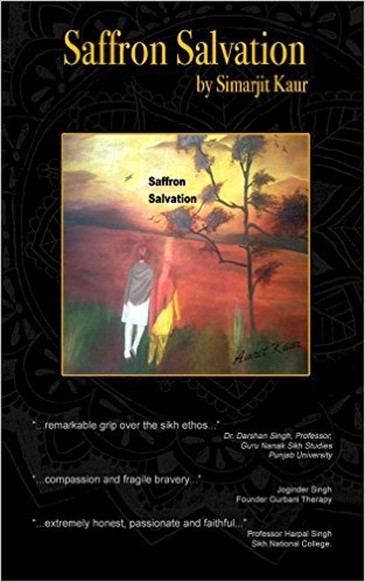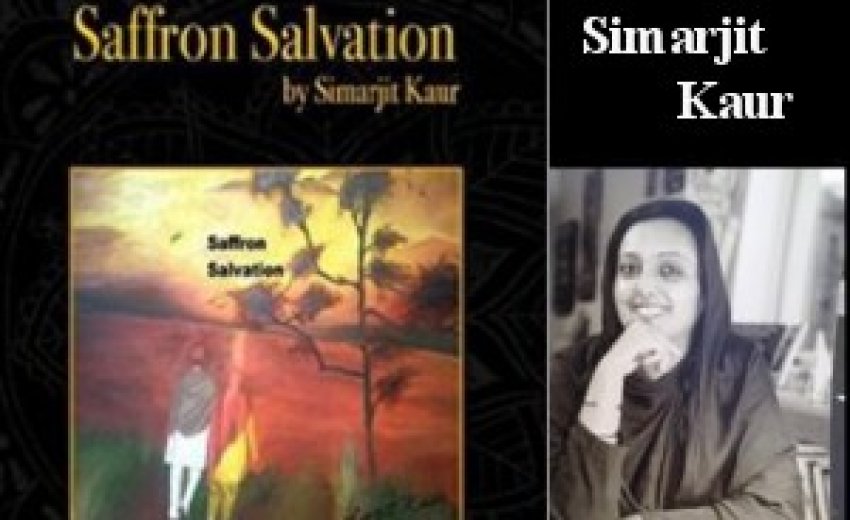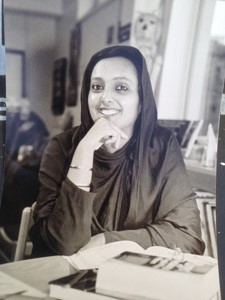Literature and Giving Voice to The Genocide of the Sikhs.
By Simarjit Kaur, Author of Saffron Salvation.
Sometime words for a writer seem impossible. Even in describing the indescribable. Your heart cannot take in the atrocities and yet you know it is important that the dead are not forgotten. What they could have been, what they were reduced to, what they fought against, what they bravely rose to. To know you survived genocide, that your nation survived genocide, to know so many did not. It doesn't mean you can begin to capture the whole picture but it means you have started to uncover your people's truth buried by the ruthless oppression that destroyed them. There is an immense need for sikhs to enter into western literature and for novels about important human rights issues like the sikh genocide to keep emerging. The power of literature is immense. It can take you to a place that you never imagined. You can taste life, breathe life like the sikhs in 1984 through your pen and you can let the world see this.
When so many thousands of sikhs were persecuted by the Indian state it is critical to remember each and everyone of these people's lives and for that we will need thousands of novels in literature.
The powers behind state genocides want history to be covered up. Genocide can sometimes be so large scale, horrific, that you forget there are such important stories to tell out there.
Sikhs have the power to tell their stories to the world but they also have the power to create Nobel Prize Winning Literature. I am an avid reader of Orhan Pamuk, the Turkish writer who won the Nobel Prize for Literature and his storytelling is superb. "Snow" is an amazing novel set in a desolate part of Turkey and he touches on so many themes within a story set in a few days. He touches on the desperation of those wanting to wear the scarf and resorting to suicide as the state forces them to not wear their scarves, to the intense descriptions of Kurdish militants in Turkey. I cannot read Turkish which is what he writes in and yet I can taste Turkey literally - past- present- future through his thoughts. I read the superb translations done from his writing in Turkish.
Turkish is not a major language in the world. Yet a Turkish writer has won the Nobel Prize for Literature. The sikhs who write in Punjabi still need major, sympathetic translations to be done as do our Holy Scriptures and there is no limit for the amazing work that can come out from the sikh nation in terms of literature.
I have been trying to write fiction for decades now. It is like wrestling with the impossible and sometimes it is so easy because of the epic people who I have known and who I have heard of.
If you feel, if your heart beats, you have the ability to let people see the world through your eyes and you have the power to help people dream of the unthinkable.
The subject matter that has haunted me time and time again in my stories has been 1984. I started writing Saffron Salvation decades ago. I would put away my attempts at novels so many times thinking someone somewhere has written the novel. But no one has written the story you need to tell. It is important that you realise that you could be the voice that needs to be heard. It doesn't matter who you are, a professor, a student, someone who is doing a job in a factory, someone who sits in an office or drives taxis. If you are moved by the world- and your soul- you could be an amazing fiction writer.
 |
| Saffron Salvation, a literary novel set in 1984 - photo courtesy of Simarjit Kaur |
Saffron Salvation started with a glimmer of an idea. I read a small pamphlet by Punjab Human Rights Organisation, PHRO, smuggled out of India and it moved me to tears how a sikh student's life was irrevocably changed forever in 1984. Over the years the story of Jassa emerged. Sometimes there are thoughts that move you and you just can't move away from questions you start to ask. You can begin by writing a daily diary that may cover mundane events and hold some of the gems of thoughts you hold and sometimes a glimmer of the answers start to emerge from the dust.
The warrior saint tradition of the sikhs is so immense. We come from such a rich tradition of writing from the time of Gurus and we must become the ears, eyes, voices of those who lost their lives and are seemingly buried alive in the sikh genocide. Don't listen to the inner censor in you that says you don't have degrees in Literature. You have to have passion and don't listen to those who say you can't do it. Your writing may edge a new voice, a new way into literature.
Saffron Salvation is a literary novel set in 1984. It is the first novel set in the sikh genocide from a sikh perspective and written in English. Three editions later after being published in 1999, enjoyed by thousands it is now an e-book on Amazon. The novel's cover uses a painting by Amrit Kaur whose family faced sedition charges in 2009 including sedition charges and raids for holdings books on the sikh genocide in India.
In Saffron Salvation Sharn travels from the UK and meets Jassa, a protestor in the Punjab civil disobedience movement, that has gone on since 1947. He believes that they are near to winning autonomy for Punjab and a federated India and Holy city status for Amritsar, the sikhs holiest sovereign city. But in 1984 Sharn's people are caught in vortex disaster that changes Jassa and Sharn's lives forever.
My father, Joginder Singh, helped me bring out the novel independently. He was a deep philosopher and spiritual thinker. At the time even academics found it hard to put their names to a book like this, but Professor Darshan Singh, Chair of Guru Nanak Sikh Studies, Professor Aujla and Professor Harpal Singh. I wanted to get published mainstream but that requires so much talent, luck and connections. Soon I was coming across people who read the book and said it was the only story that they could relate to in years!
The novel was a chosen theme of a paper at the Genocide Scholars conference in Canada and it was there that I started to explore the importance of dissent, dissidence and the epic tradition of poetry and art that many dissidence kept through imprisonment and persecution.
All my life I have met amazing sikhs and I know the nobility of the sikh character and its portrayal is to yet to unfold through the novels that hopefully you will also write one day.
It would be wonderful to see a renaissance in sikh novel writing. We have so many Bhai Vir Singh, so many Satwant Kaurs amongst us. My parents Joginder Singh and Harbhajan Kaur were spiritual, romantic but very brave activists. In the 1960's they fought for the rights of the sikhs to wear the turban and they always had panthic verve. Joginder Singh wrote beautiful poetry in Rehmat Di Jhalak that beautifully touches on a biblical vision for us as people and my parents were always organising protests and created Shere Punjab, one of the first punjabi newspapers in the UK. But by 1984 their hearts shattered as did all the sikhs around the world on seeing the terrible devastation suffered to their holy heart of Amritsar and their people. As I learned decades later at the Genocide Scholars' conference the importance of bringing voices out of terrible devastation of mass loss is where art is so powerful. I recently attended an All Parties Parliamentary group on the subject of Art and Genocide in the UK. From this meeting we learned the power art has to overcome the worse aspects of political violence. Art gives a memory even in the darkest places. Art gives a dream, even as people survive the darkest places sikhs were in June 1984 all around the world.
Since 2001 reality has crashed into my imagination for me. I have met thousands of widows of the genocide. Going beyond trying to write novels, meeting and helping widows and torture survivors of 1984-1994 was a shock to the system. Through TARAN, I set up 'the first medical network for all survivors in the region…' (Just. Ajit Singh Bains, PHRO) in 2002, after being mentored by Dr. Vincent Iaccopnio, Physicians for Human Rights, USA and brave field researchers like Harshinder Singh, Amrik Singh, Narayan Singh from the Committee for Disappearances Punjab. I was honoured to be nominated for the World Sikh Awards, 2013, for my work in TARAN. But I know in my heart it is impossible to capture and do justice and to truly help so many people when the state of India denied any official humanitarian route into the region of impunity. We were in region, being field based in a region of impunity for over a decade, using my savings, salaries, book revenues to help the widows and survivors of extra judicial killings and we were constantly running out of money.
But when you meet the real heroes and heroines of this world who have lost so much but ask for nothing, knowing history is forgetting them second by second, and you see their bravery in its deepest dimensions you know that their voices must emerge further. My father Joginder Singh encouraged me - Do something practical for them- he said knowing thanks to him I would keep writing but also knowing the words we write of them in far off lands may never reach them. This balance between practical actions and the dreams of your nation are ones that writers and activists wrestle with forever more.
The Arts play a crucial role in understanding the shock of mass atrocity. Art becomes a memorial where physical memorials of 1984 are still not possible. The bravery of poor, unknown survivors of this genocide remains unknown to this day. It doesn't matter how we reeled and tried to help these people, how the country that persecuted them did not stop mass torture, and an official humanitarian route into post conflict region was never opened, we as a nation, survivors of genocide from afar, truly failed them. Yet the bravery and spirituality of such survivors of terrible torture is so immense. The amazing works that have come out in Punjabi by brave independent writers fill a vacuum and give voice to the struggles and pains of the sikhs. There is not enough time to analyse this or give this justice. But the amazing voices that can come out in English as an international language need to be encouraged.
Lakhi and Amarpal- The Boy Who left His Heart in Punjab- my second novel is the story of man who is a doctor who is tortured for giving medical help to a wounded person who seeks his help. But Amarpal even when he leaves India dreams of going back and setting up a survivor medical network for torture survivors. I wrote this novel when I only dreamed of doing this work and then reality took me in another dimension. Many sikh doctors were persecuted by the police if they tried to treat torture survivors or wounded sikhs in the 1980's and 1990s.
The brave reviewers of Saffron Salvation kindly lent their names to an unknown novel in 1999.
"By writing Saffron Salvation the author has shown a keen sense of purpose and a remarkable grip over the sikh ethos." - Dr. Darshan Singh, Professor and Chairman, Guru Nanak Sikh Studies, Punjab University. Dr. Arjan Kirpal Singh, International Professor of Sikhism said: "At last there is a focus purely on the Sikh psyche and the question of what makes a Sikh tick…"
Professor Harpal Singh, Sikh National College wrote of the novel "…..Extremely honest, passionate and faithful to what we have witnessed over the years…'
In 1984 the world of the Sikhs shattered. We had rich dhadis, preachers, poets….who spoke unflinchingly even when facing death. Brave writers like Ram Singh Billing who died trying to reveal the truth. It would be wonderful to get publishers to back the stories as an activist and writer, this takes up so much time and perhaps we can create a climate for major sikh literature to emerge. I was inspired reading Half of a Yellow Sun which is set against the backdrop of the failed Biafra movement. But it is a third generation Biafran, Adichie, who managed to become published in the West. She acknowledges many Nigerian writers such as Chinua Achebe, who many in the west have not read, who she was inspired by. Despite our lack of understanding of the failed Biafra movement this author became a voice in the West. There is now a third generation emerging from the devastation of 1984 who need to know there is art out there and not a vacuum from which their voices could emerge. Our stories stand upon the shoulders of giants. The wonderful author Jaspreet Singh brought out Helium which is such a brave piece of fiction that uses 1984 as its theme. But we need many, many more novels and voices emerging. The story of our epic survival as Sikhs continues.
The voices of sikhs coming into literature is a power to help the world understand us and for us to understand ourselves further. The beautiful paintings of Sobha Singh, the writings of Professor Puran Singh, Bhai Vir Singh remain inspirations. But remember today you have the power to change the world's thoughts and to put pen to paper and find your voice in the world of literature.
We lost thousands of students, writers, farmers, teachers, activists, musicians, artists in the sikh genocide and perhaps you will be their voice one day.
|
Simarjit has spoken several times in British parliamentary seminars, at UN Women, Vrindavan, 2014, presenting TARAN findings, directly asking people in authority in India and Geneva- What have they done for the plight of torture survivors and why has a humanitarian route not been enabled in post conflict Punjab? There are still thousands of severely neglected cases of survivors. She is available to give voluntary talks on creative writing and humanitarian activism to sikh camps and workshops. She can be contacted on [email protected] please put Creative Writing in the header if you can set up workshops for the young. Simarjit Kaur's photo taken by Harkanwal Singh |


 Simarjit Kaur, Author of Saffron Salvation, available on Kindle.
Simarjit Kaur, Author of Saffron Salvation, available on Kindle.